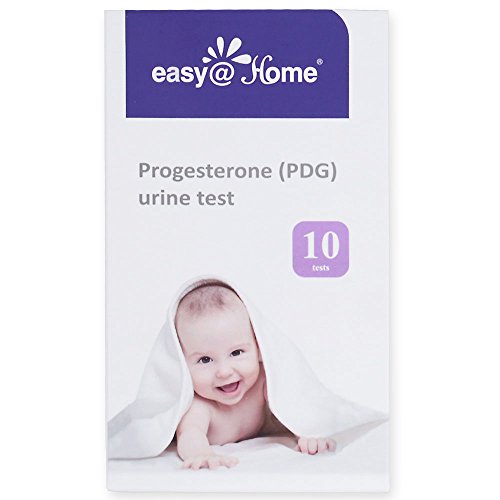Easy@Home Progesterone (PDG Test) Urine Test Strips Kit -10 Tests, Newly Launched FDA Cleared Ovulation Confirmation Test
Product Description
You will receive: Easy@Home 10 individual packaged PdG tests
What is a PdG test?
Pregnanediol Glucuronide (PdG) is the major urine metabolite of Progesterone. Progesterone is a hormone that helps prepare the female body for conception and pregnancy. Levels of Progesterone in the female body are low in the first half of the menstrual cycle, but will rise significantly after the ovulation. And progesterone levels remain high during pregnancy. Easy@Home Progesterone (PdG) Test measures the presence of PdG in urine, which has been shown to directly correlate with the presence of progesterone in blood. A Positive PdG test result may confirm that ovulation has occurred.
The PdG tests are qualitative and will show positive when it detects 5ug/ml or more of PdG in urine sample. Based off our clinical data, this cutoff level is equivalent to ~6-9 ng/ml of serum progesterone (progesterone level in blood). The range is due to slight differences in how each person metabolizes progesterone.
Why do I need to take PdG test?
While LH testing is a reliable way to detect ovulation for many women, due to several factors, ovulation may be irregular and may not occur at the same time each menstrual cycle or may not occur at all. Therefore, PdG urine testing should be performed each cycle to "double check" if ovulation has occurred to remove any ambiguity or doubt. PdG test also allows TTC women to double check ovulation at home before consulting physicians for suspected infertility or subfertility issue. Combining accurate LH and PdG tests makes the natural family planning (NFP) journey much easier.
When should I take PdG test?
It is recommended you test for PdG starting 5 days after your positive LH test until you get a positive result. The PDG tests will help you to get pregnant quicker or confirm ovulation with ease of mind.
NOTE:
It is recommended to use first Morning Urine for PdG test
What is a PdG test?
Pregnanediol Glucuronide (PdG) is the major urine metabolite of Progesterone. Progesterone is a hormone that helps prepare the female body for conception and pregnancy. Levels of Progesterone in the female body are low in the first half of the menstrual cycle, but will rise significantly after the ovulation. And progesterone levels remain high during pregnancy. Easy@Home Progesterone (PdG) Test measures the presence of PdG in urine, which has been shown to directly correlate with the presence of progesterone in blood. A Positive PdG test result may confirm that ovulation has occurred.
The PdG tests are qualitative and will show positive when it detects 5ug/ml or more of PdG in urine sample. Based off our clinical data, this cutoff level is equivalent to ~6-9 ng/ml of serum progesterone (progesterone level in blood). The range is due to slight differences in how each person metabolizes progesterone.
Why do I need to take PdG test?
While LH testing is a reliable way to detect ovulation for many women, due to several factors, ovulation may be irregular and may not occur at the same time each menstrual cycle or may not occur at all. Therefore, PdG urine testing should be performed each cycle to "double check" if ovulation has occurred to remove any ambiguity or doubt. PdG test also allows TTC women to double check ovulation at home before consulting physicians for suspected infertility or subfertility issue. Combining accurate LH and PdG tests makes the natural family planning (NFP) journey much easier.
When should I take PdG test?
It is recommended you test for PdG starting 5 days after your positive LH test until you get a positive result. The PDG tests will help you to get pregnant quicker or confirm ovulation with ease of mind.
NOTE:
It is recommended to use first Morning Urine for PdG test






